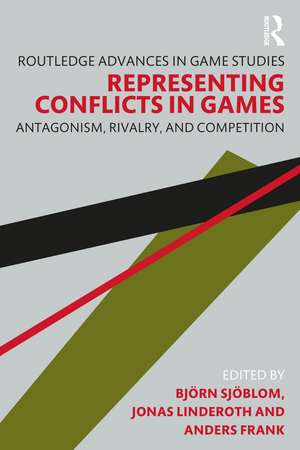Representing Conflicts in Games: Antagonism, Rivalry, and Competition: Routledge Advances in Game Studies
Editat de Björn Sjöblom, Jonas Linderoth, Anders Franken Limba Engleză Paperback – 30 dec 2022
The book asks what we can learn from conflicts in games, how our understanding of conflicts change when we turn them into playful objects, and what types of conflicts are still not represented in games. It queries the way games make us think about armed conflict, and how games can help us understand such conflicts in new ways.
Offering a deeper understanding of how games can serve political, pedagogical, or persuasive purposes, this volume will interest scholars and students working in fields such as game studies, media studies, and war studies.
Din seria Routledge Advances in Game Studies
-
 Preț: 147.91 lei
Preț: 147.91 lei -
 Preț: 303.41 lei
Preț: 303.41 lei -
 Preț: 384.86 lei
Preț: 384.86 lei -
 Preț: 334.27 lei
Preț: 334.27 lei -
 Preț: 272.75 lei
Preț: 272.75 lei -
 Preț: 384.80 lei
Preț: 384.80 lei -
 Preț: 385.00 lei
Preț: 385.00 lei - 18%
 Preț: 996.17 lei
Preț: 996.17 lei -
 Preț: 376.10 lei
Preț: 376.10 lei -
 Preț: 369.96 lei
Preț: 369.96 lei - 18%
 Preț: 1001.90 lei
Preț: 1001.90 lei - 15%
 Preț: 260.28 lei
Preț: 260.28 lei -
 Preț: 442.50 lei
Preț: 442.50 lei -
 Preț: 442.50 lei
Preț: 442.50 lei -
 Preț: 376.10 lei
Preț: 376.10 lei -
 Preț: 388.29 lei
Preț: 388.29 lei - 18%
 Preț: 1001.87 lei
Preț: 1001.87 lei - 18%
 Preț: 1006.07 lei
Preț: 1006.07 lei -
 Preț: 435.39 lei
Preț: 435.39 lei -
 Preț: 422.59 lei
Preț: 422.59 lei - 17%
 Preț: 253.67 lei
Preț: 253.67 lei -
 Preț: 385.36 lei
Preț: 385.36 lei - 26%
 Preț: 764.20 lei
Preț: 764.20 lei -
 Preț: 373.26 lei
Preț: 373.26 lei - 18%
 Preț: 1000.45 lei
Preț: 1000.45 lei -
 Preț: 376.10 lei
Preț: 376.10 lei -
 Preț: 381.39 lei
Preț: 381.39 lei -
 Preț: 422.59 lei
Preț: 422.59 lei - 16%
 Preț: 253.81 lei
Preț: 253.81 lei -
 Preț: 442.50 lei
Preț: 442.50 lei
Preț: 274.44 lei
Nou
Puncte Express: 412
Preț estimativ în valută:
52.51€ • 54.98$ • 43.45£
52.51€ • 54.98$ • 43.45£
Carte disponibilă
Livrare economică 15-29 martie
Livrare express 04-08 martie pentru 35.23 lei
Preluare comenzi: 021 569.72.76
Specificații
ISBN-13: 9781032285597
ISBN-10: 1032285591
Pagini: 258
Ilustrații: 5 Halftones, black and white; 5 Illustrations, black and white
Dimensiuni: 156 x 234 x 17 mm
Greutate: 0.52 kg
Ediția:1
Editura: Taylor & Francis
Colecția Routledge
Seria Routledge Advances in Game Studies
Locul publicării:Oxford, United Kingdom
ISBN-10: 1032285591
Pagini: 258
Ilustrații: 5 Halftones, black and white; 5 Illustrations, black and white
Dimensiuni: 156 x 234 x 17 mm
Greutate: 0.52 kg
Ediția:1
Editura: Taylor & Francis
Colecția Routledge
Seria Routledge Advances in Game Studies
Locul publicării:Oxford, United Kingdom
Public țintă
Postgraduate and Undergraduate AdvancedCuprins
List of Contributors; Acknowledgements; The Inevitable Relation Between Games and Conflict: An Introduction; Part I: Game Systems, Transformation, and Learning; 1. Red in Bits and Bytes: Evolutionary Conflicts in Biological God Games; 2. On Bikers at War: Transformations of Non-Fictional and Fictional Conflicts from Hamlet to Sons of Anarchy: Men of Mayhem; 3. From Zero-Sum Business Games to Coopetitive Simulation; 4. The Limits of ‘Serious’ Play: Frame Disputes Around Educational Games; Part II: Representing War and Armed Conflicts; 5. On Wargames and War: Modelling Carl von Clausewitz’s Theory of War; 6. Wargames as Reenactment: An Ecological Framework for the Development of Military Games for Education; 7. The Grasping Eye: Wargames and the Ideal-Typical Field Commander’s Inner Vision; Part III: Critical Perspectives on Conflicts in Games; 8. War Never Changes? Creating an American Victimology in Fallout 4; 9. Are the Bullets Going Over our Head? Designed Ambivalence in the Representation of Armed Conflict in Games; 10. Where are the White Perpetrators in all the Colonial Board Games? A Case Study on Afrikan Tähti; Part IV: Alternative Ways of Representing Conflicts in Games; 11. Narrative and Mechanical Integration: Playing with Interpersonal Conflicts in Life is Strange; 12. The Most Intimate Conflict of all: Marriage as Conflict in Digital Games; 13. All Smoke, No Fire: The Post-Mortem of Conflicts in the ‘Walking Simulator’ Genre; Index
Notă biografică
Björn Sjöblom is Senior Lecturer at the Department of War Studies and Military History at the Swedish Defence University.
Jonas Linderoth is Professor in the Department of Education, Communication and Learning at the University of Gothenburg, and Visiting Professor at the Department of War Studies and Military History at the Swedish Defence University.
Anders Frank is Senior Lecturer at the Department of War Studies and Military History at the Swedish Defence University.
Jonas Linderoth is Professor in the Department of Education, Communication and Learning at the University of Gothenburg, and Visiting Professor at the Department of War Studies and Military History at the Swedish Defence University.
Anders Frank is Senior Lecturer at the Department of War Studies and Military History at the Swedish Defence University.
Descriere
This book offers an overview of how conflicts are represented and enacted in a variety of game genres and systems, highlighting the intrinsic connection between games and conflict through a set of theoretical and empirical studies.
